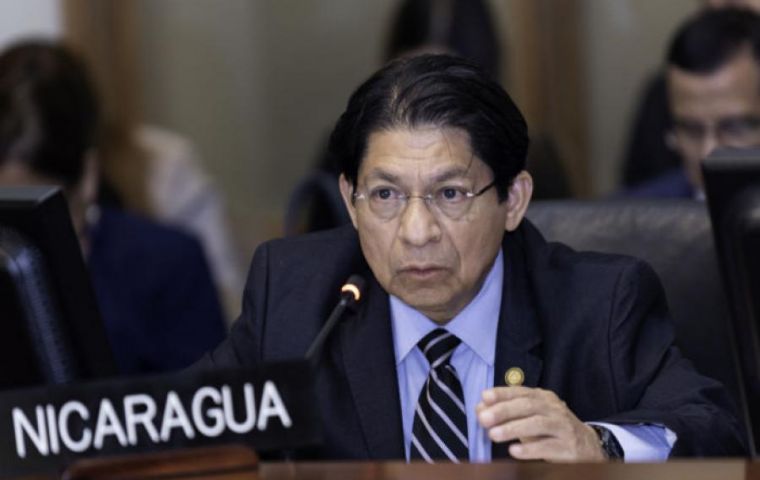MercoPress. South Atlantic News Agency
Nicaragua pulling out from OAS, FM announces
 “Nicaragua makes use of its full sovereign rights,” Moncada said
“Nicaragua makes use of its full sovereign rights,” Moncada said Nicaragua's Foreign Minister Denis Moncada Friday announced his country has started procedures to withdraw from the Organization of American States (OAS), because it does “not respond to the interests of their respective peoples.”
Moncada also said the OAS took advantage of the subordination of some governments to other interests, which is why his country would denounce the OAS Charter so as to “put an end to an unfriendly, offensive and outrageous relationship for Nicaragua.”
The Foreign Minister insisted the OAS was the instrument of the United States to interfere in the internal affairs of nations in the region.
”Nicaragua makes use of its full sovereign rights (...) We have made the decision to denounce the OAS letter and disassociate ourselves from that organization,“ Moncada told the Venezuelan outlet TeleSur.
”The OAS continues to be the instrument created by the United States to project its interventionist and hegemonic policy of intervention, of threat, of aggression against the countries of Latin America and the Caribbean,“ he stressed.
Under instructions from President Daniel Ortega, Nicaragua has set off the process to withdraw from the OAS, which continues ”to take advantage of the subordination of some governments of Latin America and the Caribbean that do not respond to the interests of their respective peoples.“
”Nicaragua, under President Ortega and Comrade Rosario [Vice President Murillo], we have maintained a position of struggle, defense and strengthening of the anti-imperialist and anti-colonialist positions of powers such as the United States and some countries of the European Union,” Moncada underlined.
Moncada also highlighted the existence of other regional forums outside the OAS, such as the Bolivarian Alliance for the Peoples of Our America - Peoples' Trade Treaty (ALBA-TCP) and the Community of Latin American and Caribbean States (Celac), which allows “to advance with the approaches and interests of the peoples.”
The Foreign Minister also hoped other Latin American and Caribbean countries would withdraw from the OAS, considering that it is an inappropriate instrument. “The peoples of Latin America and the Caribbean are advancing and becoming aware of the maneuvers that affect their own interest. We hope that the peoples will demand that their governments maintain a position in the OAS of respect for other countries, and that they move away from a body that is harmful to nations.”
“The OAS is increasingly irrelevant,” said the executive secretary of ALBA-TCP, Sacha Llorenti following Moncada's announcement. “Nicaragua's sovereign decision to withdraw from the OAS is a worthy response to the constant attempts of that organization to commit acts of interference,” Llorenti added on Twitter.
“We support Nicaragua's decision to withdraw from the OAS, which constitutes a firm and dignified response to the maneuvers of that organization's secretary general, in collusion with the United States,” Cuban Foreign Minister Bruno Rodriguez also on Twitter.
The Government of Venezuela also issued a statement in support of the Nicaraguan decision, saying that “the continued and slavish practice of the Secretary General of the OAS, Luis Almagro, squandered the last vestiges of hope for the renewal of this unrepentant organization that was born to instrumentalize the Monroe doctrine.”
“This discredited OAS has served as a platform for the United States, to consummate its conspiratorial plans against the will of the peoples, with infamous pretense of abrogating rights that are only consecrated to sovereign States, undermining the foundations and principles of coexistence of the International Law,” the statement went on.
Former Bolivian President Evo Morales also stood behind Ortega's decision because “the coup leader Luis Almagro has become an instrument of US interventionism, racism, fascism and imperialism in Latin America.” In Morales' view, Bolivia has been a victim of Almagro's interference in the events leading up to his own resignation and the Jeanine Áñez government after 38 deaths and several hundred people wounded, detained and persecuted.




Top Comments
Disclaimer & comment rulesCommenting for this story is now closed.
If you have a Facebook account, become a fan and comment on our Facebook Page!